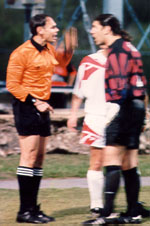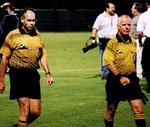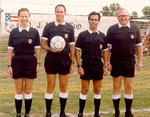Soccer a second career for Poyer
Story by Michael Baker,photos provided by Bob Poyer
Bob Poyer hears it everywhere. In the classroom, on the street, as close as Stoney Field, and as far away as Oklahoma.
“You look really familiar. Where have I seen you before?”
And Poyer, assistant director of the MUSC Library for Public Services and Education, can’t help but laugh whenever he hears that question. For all of the nondescript stereotypes that come with the library profession, Poyer continually surprises people.
The eyes of MUSC students widen when they realize their professor also served as a referee for some of their youth, high school, collegiate, and professional soccer games. Alternately, soccer players get a jolt when they see “that guy from the library” stepping onto the field to officiate their games.
 Poyer
has a discussion with Long Island Rough Rider Tony Meola during a 1995
Charleston Battery match. Meola is a member of the U.S. Men's National
Team and the Major League Soccer's Kansas City Wizards.
Poyer
has a discussion with Long Island Rough Rider Tony Meola during a 1995
Charleston Battery match. Meola is a member of the U.S. Men's National
Team and the Major League Soccer's Kansas City Wizards.
Poyer’s love of soccer is neither fleeting nor recently acquired. His involvement in the sport stretches back to his childhood days.
As a sixth-grader, Poyer’s mother wouldn’t let him play football, so he joined the soccer team. Upon his graduation from high school, Ball State University gave him a full scholarship to play for its soccer team, a move that would indirectly lead Poyer to refereeing.
“The university had given me the opportunity to play a game that I love and to get a free education,” he said, “ and I wanted to give back to the game.”
So when the school’s intramural soccer league needed referees, he volunteered. The decision marked the first step in what has become a veritable second career for the MUSC employee.
 After
a game: Poyer, left, and Dr. Don Wilbur.
After
a game: Poyer, left, and Dr. Don Wilbur.
After Poyer’s time at Ball State, Don Wilbur, Ph.D. and professor of anatomy at MUSC, recruited him to coach in the South Carolina Youth Soccer Association (SCYSA). Wilbur also encouraged him to become a United States Soccer Federation referee and, in 1985, the state’s referee administrator—a position that Poyer still holds.
“The scope of that responsibility is pretty big,” he said. “The state referee administrator is responsible for all United States Soccer Federation referees in South Carolina. That’s close to 1,000 people.”
Furthermore, Poyer believes that his services as referee administrator directly led to his election into the SCYSA Hall of Fame.
 Bob
Poyer, second from left, and fellow referees prepare for 1991's Under-16
Girls National Championship match in Omaha, Nebraska.
Bob
Poyer, second from left, and fellow referees prepare for 1991's Under-16
Girls National Championship match in Omaha, Nebraska.
The administrator’s responsibilities include observing other referees and developing those who possess the potential to work at the higher levels, especially the professional league.
It’s fitting, then, that Poyer’s role model is the man who selected and developed him for the same job: Don Wilbur.
“Don is my mentor,” Poyer said. “He taught me so many things.”
Wilbur’s teachings help Poyer in both soccer and in life. He shared an example of the latter when talking about the “economics of training.”
“As it applies to the soccer field, the economics of training refer to how referees have to do many things—mentally and physically—at once,” Poyer explained. Using the same concept of efficient multi-tasking, he developed a more focused teaching plan for his students. Since then his students have furthered their involvement in research projects while becoming more motivated as well.
Considering the depths to which Poyer immerses himself in soccer, both now and in the past, the real surprise is that he has time to develop teaching plans at all.
Among his more memorable experiences, Poyer recalls serving as a referee in the 1991 SCYSA National Youth Championships in Omaha. He also officiated many local collegiate matches, including a number of games in both the Atlantic Coast Conference and NCAA tournaments. Perhaps most impressive, he served on the officiating crew during the Charleston Battery’s championship game in 1996.
While those occasions would represent important milestones in many referees’ careers, Poyer said that his best experience in soccer has nothing to do with a single moment or game.
“I’m just grateful that I’ve gotten the opportunity to meet so many people and to give back something to the community,” he said. “I love soccer, and I’ve got 10,000 stories I could tell, so many wonderful experiences.”
On several occasions, he met people in board meetings at MUSC who knew him through his work on the soccer field. Sometimes, his encounters occur farther from home. While working in a regional tournament in Oklahoma, he ran into a number of MUSC employees in- between games.
Although he doesn’t take himself too seriously, Poyer also mentioned the possible therapeutic aspects of refereeing—not for himself, but for others.
“In any sport, people vent at the officials,” he said. “I don’t mind. I figure it’s generally a safe forum for them to release some frustration. I rarely take it too seriously, especially when some of the comments are so ridiculous.”
Occasionally, the fans reward his sense of humor. Poyer once made a judgment call at a Charleston Battery game in front of a group of his students. In the silence following the penalty, one student yelled, “Hey, Bob! It’s a good thing you’ve still got your job in the library!”
Whether for therapeutic reasons, for love of the game, or for a change of pace, soccer plays a defining role in Poyer’s life. Yet he views the sport not as an overarching theme, but as part of a well-rounded existence.
Sitting in his office on the library’s fourth floor, he recounted a conversation with a close friend. The two men were discussing how Poyer always seemed busy with his work at MUSC, with soccer, with his family, and with the spiritual and public communities.
“My friend was joking around, saying, ‘Bob, you have no life,’” Poyer
recalls, laughing. “But I think I have a rich life, and soccer’s been a
fun part of it.”
Catalyst Online is published weekly, updated as
needed and improved from time to time by the MUSC Office of Public Relations
for the faculty, employees and students of the Medical University of South
Carolina. Catalyst Online editor, Kim Draughn, can be reached at 792-4107
or by email, catalyst@musc.edu. Editorial copy can be submitted to Catalyst
Online and to The Catalyst in print by fax, 792-6723, or by email to petersnd@musc.edu
or catalyst@musc.edu. To place an ad in The Catalyst hardcopy, call Community
Press at 849-1778.